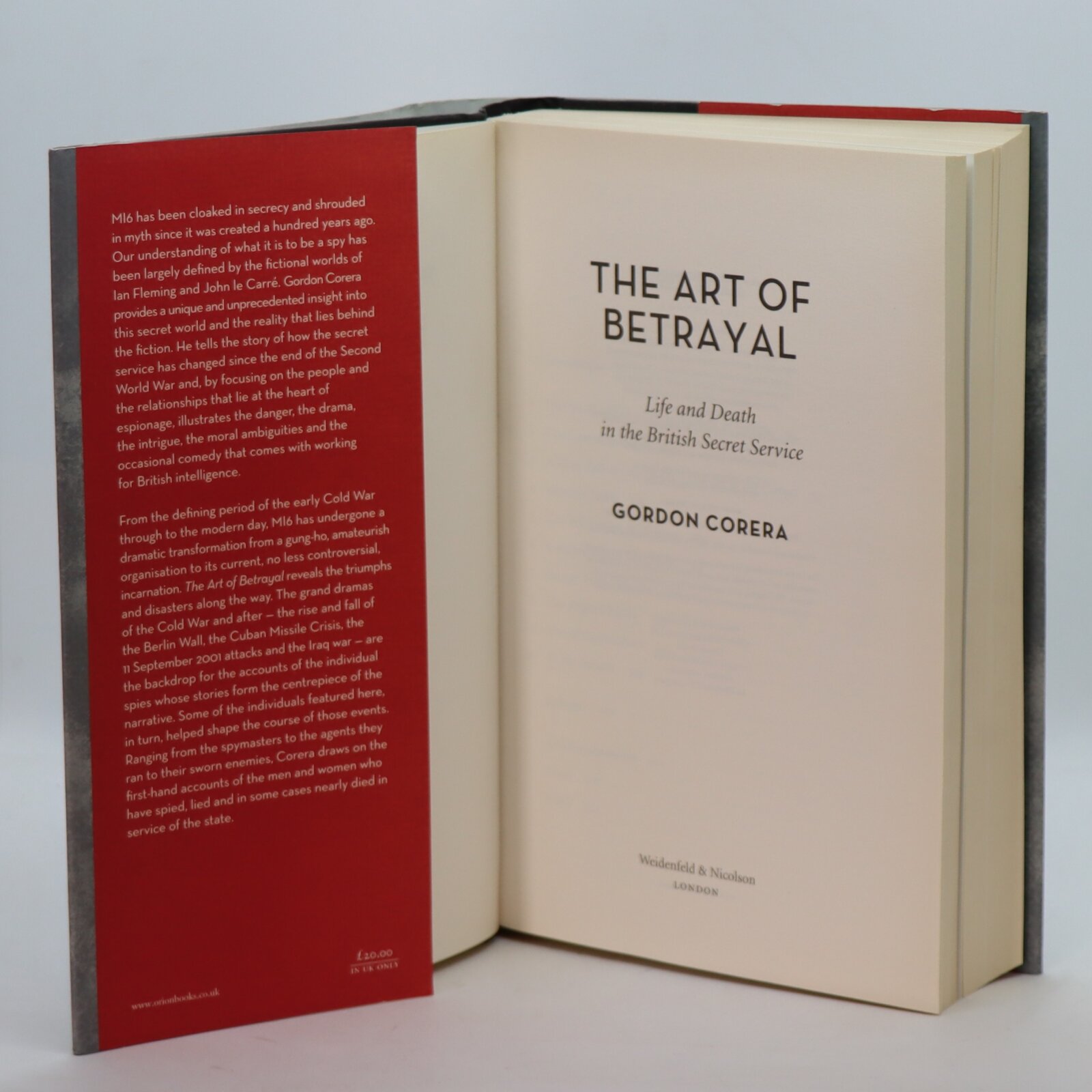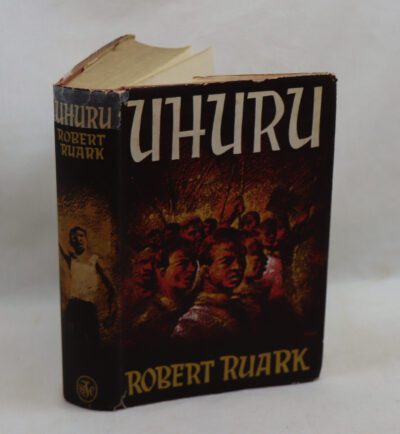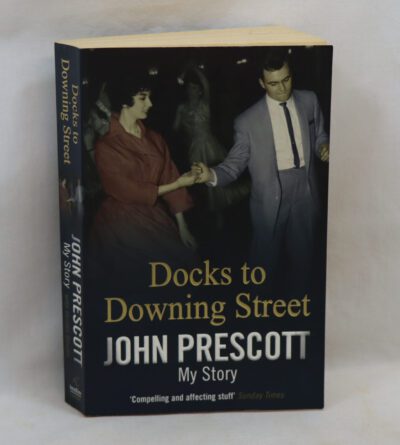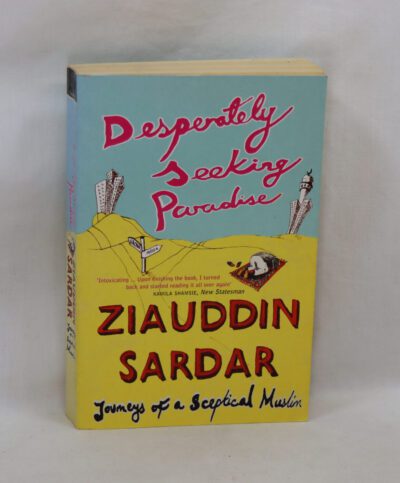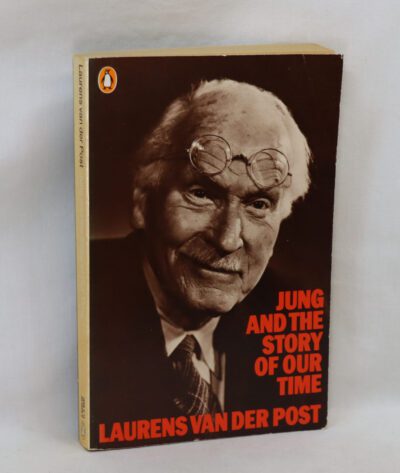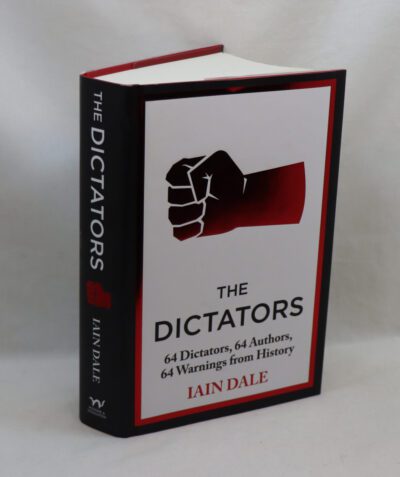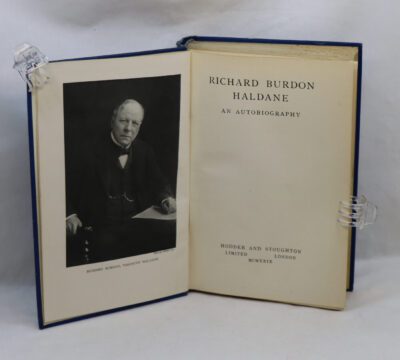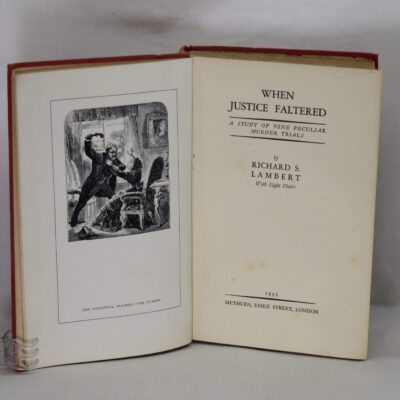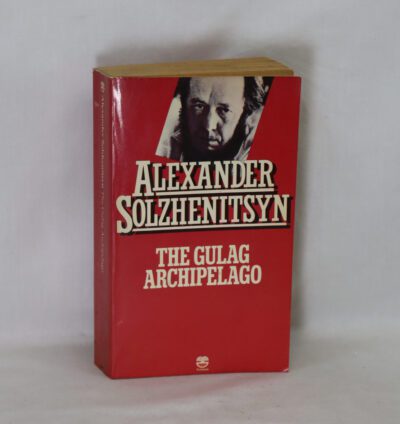The Art of Betrayal.
By Gordon Corera
ISBN: 9780297861010
Printed: 2011
Publisher: Weidefield & Nicolson. London
Edition: First edition
| Dimensions | 17 × 25 × 4 cm |
|---|---|
| Language |
Language: English
Size (cminches): 17 x 25 x 4
Condition: Fine (See explanation of ratings)
Your items
Item information
Description
In the original dustsheet. Black cloth binding with red title on the spine.
F.B.A. provides an in-depth photographic presentation of this item to stimulate your feel and touch. More traditional book descriptions are immediately available
A First Edition, and a most informative read to boot
Gordon Corera MI6: Life & Death in the British Secret Service is more than an unofficial history of the intelligence services abroad since 1946. It could not just begin where Jeffery’s official history ended in 1949 MI6: The History of the Secret Intelligence Service 1909-1949 . To understand the post-war service in the world Corera had first to return briefly to its origins, its subsequent expansion during two world wars, with the much criticized unorthodox commando type SOE operations behind enemy lines to set “Europe ablaze” during 1940-45 Foyle’s War – Series 8 [DVD ], quickly wound down in 1945 with certain of the personnel being absorbed; secondly, he showed it had to take over tasks in former colonies in Africa and Asia which until their independence had been part of the duties of the home intelligence organisation, MI5; and third, and finally, being the older agency to the US’ OSS (quickly re-founded as the CIA) in the West, it is much a history of western intelligence with the American service quickly in the ascendant, becoming the main leading force sometimes cooperating with, at other moments acting alone, or with other national services, with its own distinct political agenda and its own methods, as in its war on terror in the Guantanamo Bay camp, with Britain far from being treated with respect as its poor junior partner, it gets criticised as being squeamish, unaccommodating to the desires of a pushy imperialist Uncle Sam, and contrary.
The lion share of the volume – over 70 per cent, deals with MI6’s work in the Cold War when the enemy was known to be Communism led by the Soviet Union’s KGB, with its loyal bed fellow organizations in its satellite states. Corera moves from factual evidence to fictional stories and back, demonstrating how correct Conrad Heart of Darkness and The Congo Diary (Penguin Classics) by Conrad, Joseph Revised Edition [Paperback(2007) ], Fleming From Russia with Love: James Bond 007 (Vintage Classics) , Greene The Third Man , Le Carré The Spy Who Came in from the Cold (Penguin Modern Classics) and Maugham Ashenden Or The British Agent were (the cold George Smiley with a passion for medieval history became the model for the counter-intelligence chief Maurice Oldfield), and concludes that the subtle world of counter-intelligence, like indeed the fragmented one of medieval history, would rage over what each individual jigsaw piece signified as entire interpretations would be created upon those shards. Counter-intelligence required a suspicious mind and one could always trump one’s colleagues by showing that you were capable of suspecting something more devious than they could manage. It was not sound to remain in that section too long, as it made operators imagine shadows suddenly creeping up on everyone everywhere.
Spying, which required cultivating trust, has always been thought essential by the state to acquire intelligence to manage hostilities, in order to hide one’s own weaknesses and to re-project one’s imagined strengths. Britain reached its nadir in the 1950’s and 60s with first the dis- and later re-appearance in Moscow first of Burgess and Maclean, and then of Philby and Blake, after which MI6 believed other undiscovered moles were still operating (in addition to those such as Blunt who had confessed as early as 1963), so making even her close ally at Langley, Virginia, across the Atlantic pond, unable to trust Britain’s proven skills and resourcefulness, or willing to freely cooperate with necessary information if it then undermined the safety of their own agents and informants. Worse, such an poisonous atmosphere made it difficult henceforth for new possible Soviet informants to be accepted, suspected as nothing less than enemy plants, and being kept waiting so long they would then prefer to switch allegiance and sell their wares by turning to the richer funded Americans.
Corera, however, does stress that over 40 years this black cloud did not remain entirely around MI6 as it did manage to recruit Oleg Gordievsky, an operator in Copenhagen and later in Prague, as well as Vasili Mitrokhin, a KGB archivist The Mitrokhin Archive: The KGB in Europe and the West (Penguin Press History) , who finally delivered 6 trunks of papers. Instead, in April 1985, Philby’s equivalent, the head of CIA counter-intelligence Aldrich Ames, walked into the Soviet Embassy, in Washington, and happily volunteered to work for them. To US discomfort it was nine years before his movements were eventually unmasked, during which Moscow had virtually deduced that Gordievsky was the “degenerate”, “maladjusted” traitor. The West had few success stories to brag about: many brave British agents and local collaborators in Albania and Lithuania in the 1940s quickly went to their graves, only much later proven to be due to that “traitor” Philby.
On the other hand, for all his achievements, and his promotion to colonel in the KGB “Kim” Philby was never trusted by his superiors based at the Lubyanka in Moscow. Despite his pledged loyalty to Communism since the 1930s, of only serving as a Soviet agent and never a double agent The Private Life of Kim Philby , they continually identified him as being British, a son of the establishment, they never ceased to believe London to be so stupid to be fooled for so long; rather they were quite certain that somehow he must have always fooled both of them and they had used him as infantile ideologue. This itself demonstrated the real mastery and success of that agent when practising deception in London or Washington; for both Western allies and the Soviets know the absence of evidence that an operator is betraying a country is not evidence of its absence; rather it may be, just as it may not; it simply implies the enemy is exceptionally well gifted in the black arts of lying and deception.
The author here lets the cat out of the bag on three mole hunters: Arthur Martin, Stephen de Mowbary, and Peter Wright, a nugging expert who in the 1980s caused a scandal publishing his life story, Sycatcher, a most boring work. Spycatcher What Corera reveals shows that the agency was its own worse enemy, never wishing to clean out the traitors for fear of destroying whatever good that was left.
Much of the final chapters following the break up the Soviet Union is less analytical, and more journalistic about the campaign in Afghanistan. What becomes clearer is that unlike the Cold War the foe now is less familiar and more complicated. Spying, for the author, involves wandering in a dark foggy environment: it may concern the Chinese, Arab states – Libya until the death of Colonel Gaddafi or now Syria, and Putin’s Russian KGB successors the FSB and the foreign intelligence service the SVR; perhaps, it may involve cooperating hand in hand with MI5, something which historically both know is vital but neither have great fondness for one another, in order to uncover second generation British-Asians involved in “home grown terrorism” as in the 7/7 London bombings in 2005, so that the moment these troops or pawns fly off into the sun they are instantly retraced in their foreign surroundings.
MI5 and MI6 contrary to Bond films, and to the nature of the CIA, should not necessary have a licence to kill. I emphasize the conditional “should” because MI5 when operating with the RUC in Ulster (whether officially, unofficially, or operating as unofficial undercover rogue individuals) during the Troubles in the 1970s and 80s were accused of murder in Catholic areas of Belfast Harry’s Game .
They must respect the terms of the Geneva Conventions, in particular with regards to Guantanamo Bay, and it has come to the author’s ears that British citizens in MI6 have been operating unofficially in CIA projects while MI6 have not been informed. The problem is those in the know may be summoned to reveal sources in British courts, which would effectively undermine both the safety of British-Asian agents, and making it more difficult to encourage recruitment from those ethnic groups.
Worst of all for the state, all British Ministries since the late 1980s have become too legal risk conscious (it has nothing to do with Ministries becoming soft with the appointment of women heads Stella Rimmington and Dame Eliza Mannigham-Buller to these services), deciding if the intelligence being demanded is really worth the consequences should anything turn out badly. This not only on the one hand removes the rash adventurous spontaneity of cavalier operations of the SOE kind, but it makes agents and their agencies become much more cautious, when caution in the field as Special forces in Afghanistan discovered can mean the difference of a fraction of a second between saving a life of a comrade in a cross fire, and his or now also her certain costly death.
Corera chooses not to turn to Putin’s schemes – interested readers might divert their attention to Edward Lucas The New Cold War: Putin’s Threat to Russia and the West – because they go beyond intelligence gathering, or small quick operations with a few persons but planning war. Also despite much speculation one can not know what is going to happen for certain under the new Trump Presidency starting in January 2017. No doubt, spying will never stop as it is described as the “second oldest” occupation; it will just take on a different framework to adapt for the change in policies of the government in office.
Readers should realise that as Security correspondent for the BBC Gordon Corera is extremely knowledgeable of the those with the right information as his predecessors in the 1920s and 30s press informants behaved as the extended unofficial wing of the secret services abroad: the Nazis and the Soviets each were very wary of the foreign press prior to conflicts because they could spread “propaganda” – meaning different unacceptable reports to the state official ones, and all stories without the protection of the diplomatic bag needed to be blocked; Philby too, was able to move in and out of journalism between appointments as he was in Beirut before his final flight to Moscow.
This “unofficial” history may act as the first present step before an official survey is unleashed onto the market; for as Christopher Andrew’s fairly recent authorized history of MI5 demonstrated it no longer signifies as in past days the view from within, of faceless, nameless or named aliases it contained episodes, chapter and verse that were praiseworthy and ones which were openly as critical as Corera has been The Defence of the Realm: The Authorized History of MI5 . The history of the secret services, obviously, is becoming less secret and closed, more of decisions and individuals, and multi-dimensional with many interpretations provided until strange unconfirmed facts years later are finally proven.
Want to know more about this item?
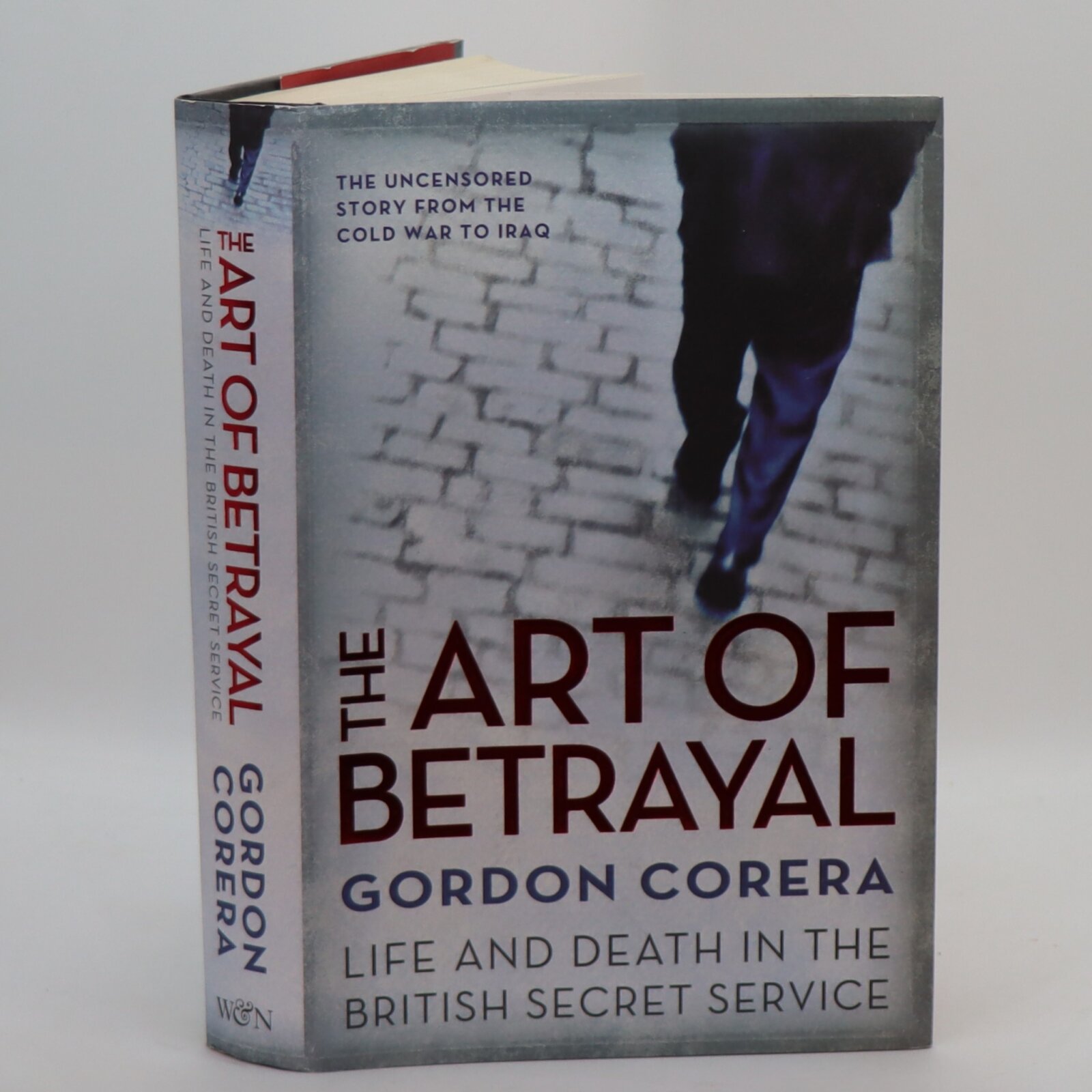
Related products
Share this Page with a friend

